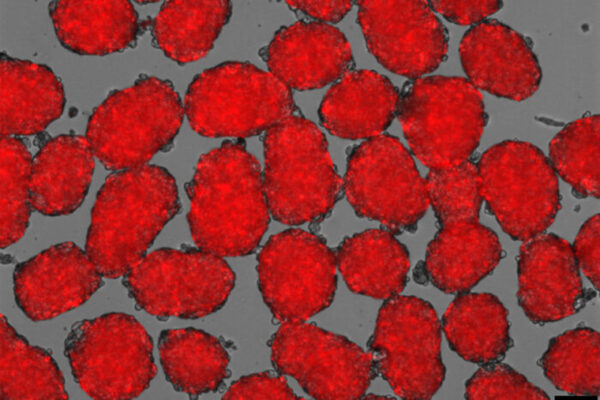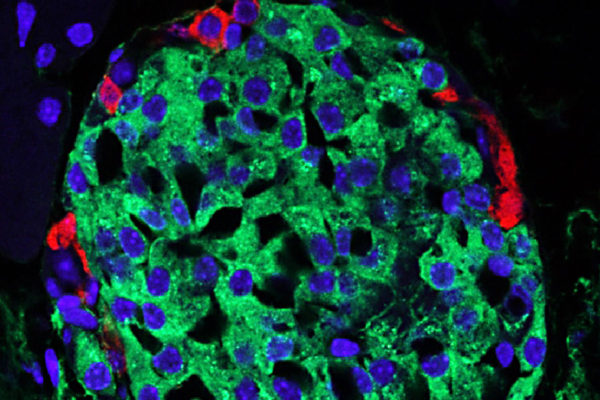New hope for stem cell approach to treating diabetes
By tweaking the recipe for coaxing human stem cells into insulin-secreting beta cells, a team of researchers at the School of Medicine has shown that the resulting cells are more responsive to fluctuating glucose levels in the blood. The finding may lead to a new approach to treating diabetes.
Reducing the burden of diabetes
Ross Brownson, the Bernard Becker Professor at the Brown School and director of the Prevention Research Center, has received a $2.9 million grant from the National Institutes of Health to find ways of reducing the burden of diabetes by increasing adoption of proven programs and policies among local health practitioners.
A step toward personalized diabetes treatments
Signaling a potential new approach to treating diabetes, researchers at Washington University School of Medicine in St. Louis and Harvard University have produced insulin-secreting cells from stem cells derived from patients with type 1 diabetes.
Nerve injury appears to be root of diabetes-related vision loss
New research from the School of Medicine indicates that much of that diabetes-related vision loss may result from nerve cell injury that occurs long before any blood vessels are damaged. The finding may lead to new approaches to treating it.
Rare form of diabetes may require alternate treatment
Patients with a rare, genetic form of diabetes often are misdiagnosed as having type 2 diabetes because the two share symptoms. But new research at the School of Medicine suggests that treating such patients with therapies designed for type 2 diabetes is potentially harmful and guidelines need to change.
New strategy to lower blood sugar may help in diabetes treatment
Working in mice, researchers at Washington University School of Medicine in St. Louis led by Brian N. Finck, PhD (left), and Kyle S. McCommis, PhD, showed they could reduce glucose production in the liver and lower blood sugar levels. Their approach — shutting down a liver protein involved in making glucose — may help treat type 2 diabetes.
Potential treatment target identified for rare form of diabetes
Scientists working to find treatments for a severe form of diabetes called Wolfram syndrome have identified a gatekeeper in cells that prevents harmful molecules from spilling into places where they don’t belong and triggering cell death. The researchers, at Washington University School of Medicine, also found that the gatekeeper may be a good treatment target for other disorders caused by cellular stress.
Obesity, excess weight in U.S. continue upswing
Obesity and excess weight, and their negative impact on health, have become a significant focus for health-care experts in recent years. But new research at Washington University School of Medicine shows that an escalation in the number of those considered obese or overweight in the U.S. continues, signaling an ongoing upward swing in chronic health conditions as well.
Diabetes drug may reduce heart attack risk in HIV patients
A diabetes drug may have benefits beyond lower blood sugar in patients with HIV. New research from the laboratory of Kevin E. Yarasheski, PhD, suggests the drug may prevent cardiovascular problems because it works to reduce inflammation that is linked to heart disease and stroke in these patients. The drug both improved metabolism and reduced inflammation in HIV-positive adults on antiretroviral therapy.
Scientists find new link between diabetes and Alzheimer’s
Researchers have uncovered a unique connection between
diabetes and Alzheimer’s disease, providing further evidence that a
disease that robs people of their memories may be affected by elevated blood sugar, according to scientists at
Washington University School of Medicine in St. Louis.
View More Stories





